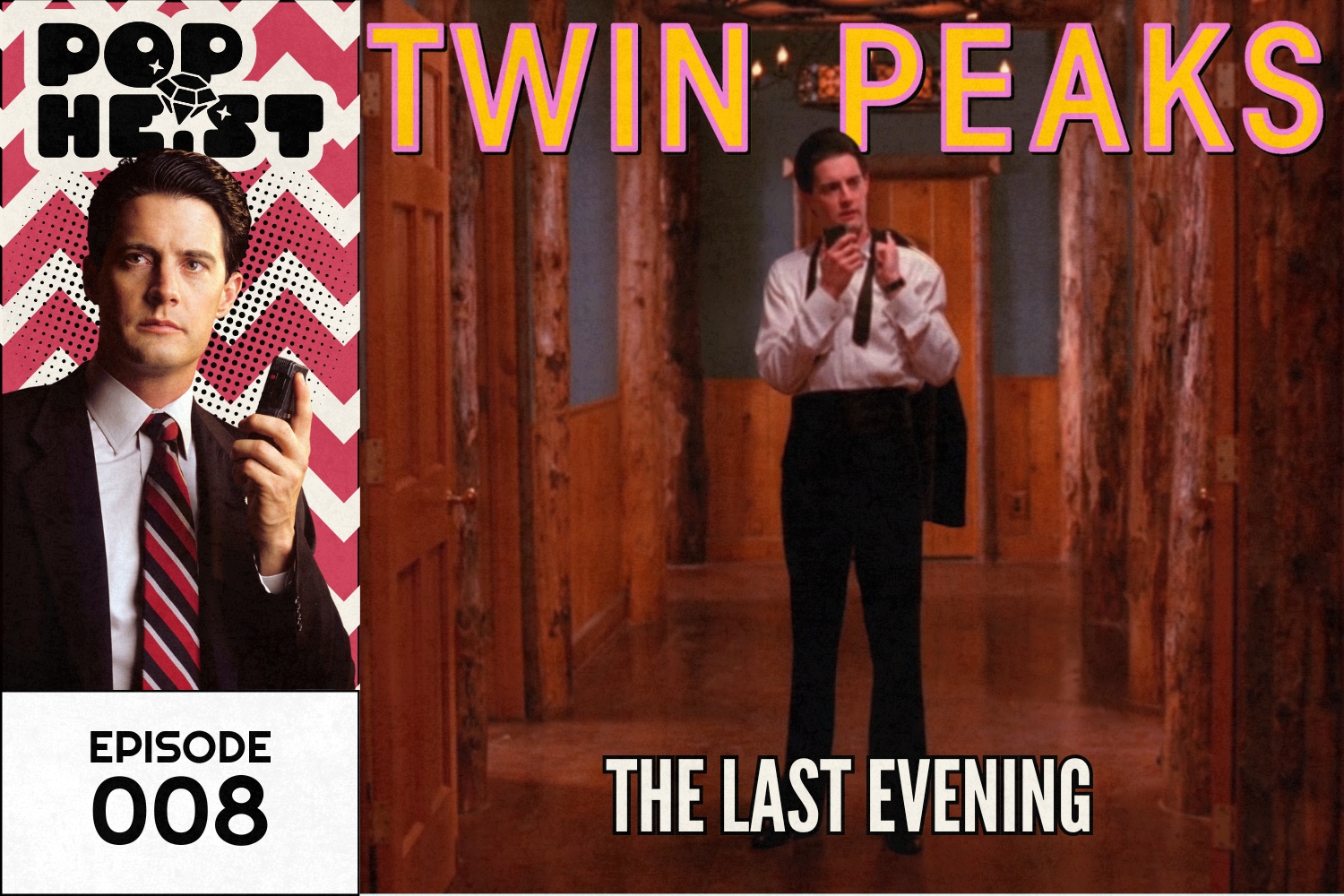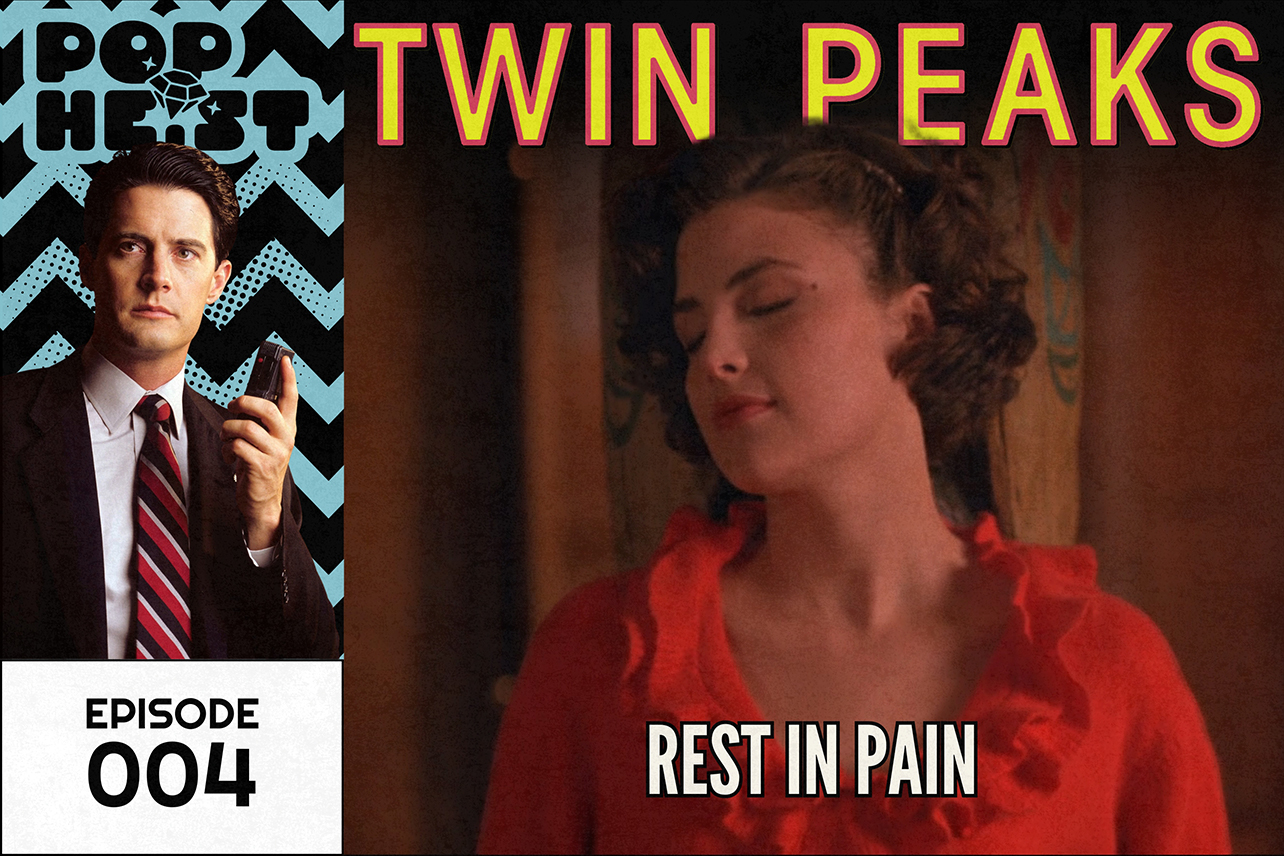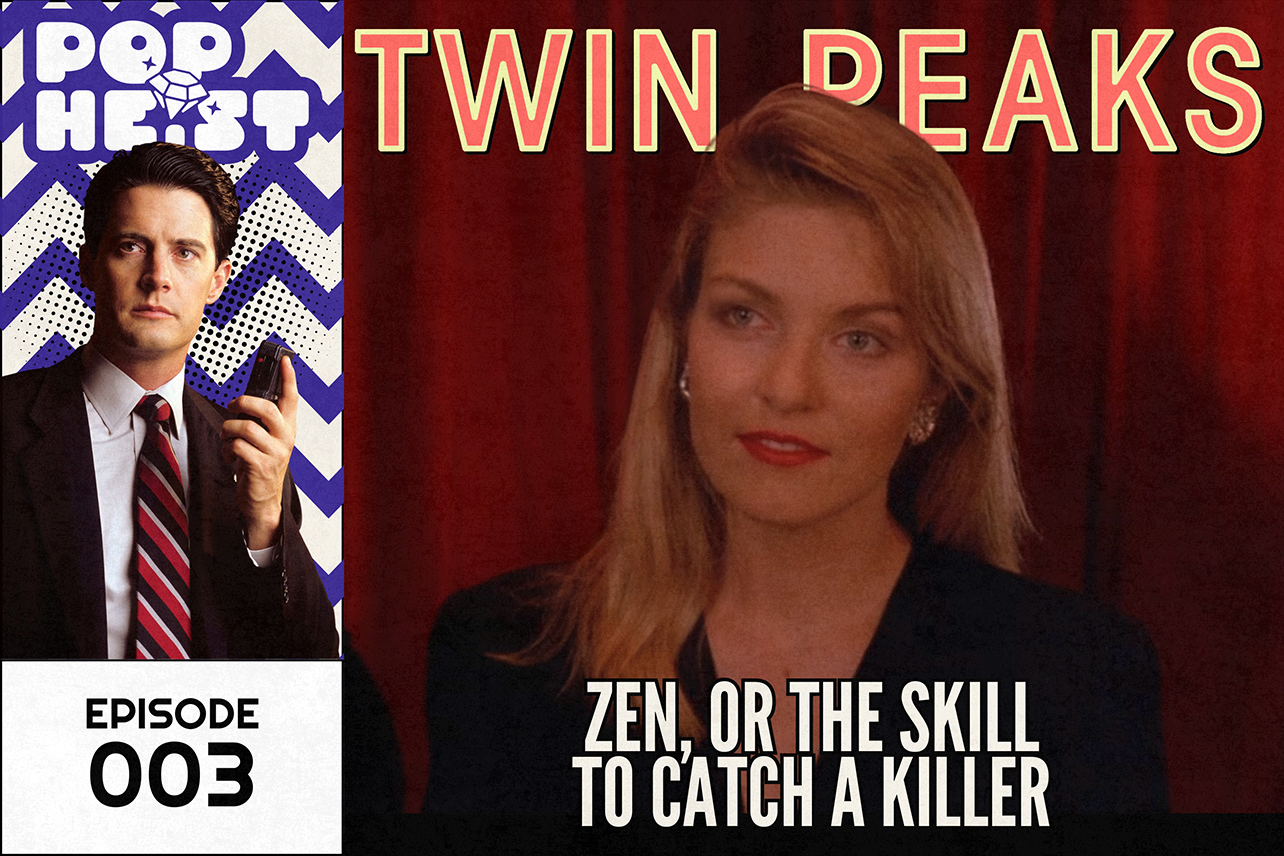In PRESTIGE PREHISTORY, Pop Heist critic Sean T. Collins takes a look at classic TV shows that paved the way for the New Golden Age of Television — challenging, self-contained stories from writers and filmmakers determined to push the medium forward by telling stories their own way.
The Prisoner Episode 3 (airdate order) / Episode 8 (AVC order)*
"A. B. and C."
Original Airdate: Oct. 13, 1967
Writer: Anthony Skene
Director: Pat Jackson
Cast: Patrick McGoohan, Colin Gordon, Sheila Allen, Katherine Kath, Peter Bowles, Annette Carell
*NOTE: The Prisoner's proper running order is a matter of dispute; Pop Heist is using the AV Club order for the show
It was a dark and stormy night. That alone should tell you that this episode of The Prisoner is different. Despite the frequent weather reports warning of a slight chance of rain and prompting practically the entire Village to carry umbrellas around in the bright seaside sunshine in seemingly every other episode, we've never seen actual inclement weather before — never even heard it, outside of the thunderous opening credit sequence. From out of the rain, two Village goons in veddy English macs and wellies haul an unconscious Six to his latest experimental procedure.
It's an experimental procedure for The Prisoner, too. Continuity has never been this show's strong suit, to say the least — I mean, no one really knows what order the episodes are even supposed to be shown in, a problem you wouldn't run into if someone tossed you a jumbled-up season of The Wire and told you to figure it out. But in "A. B. and C.," Patrick McGoohan and his collaborators go (comparatively) continuity-crazy.
First, they give us our first-ever recurring Number Two, the bespectacled and turtlenecked milk-drinker played by Colin Gordon in our last episode, "The General."
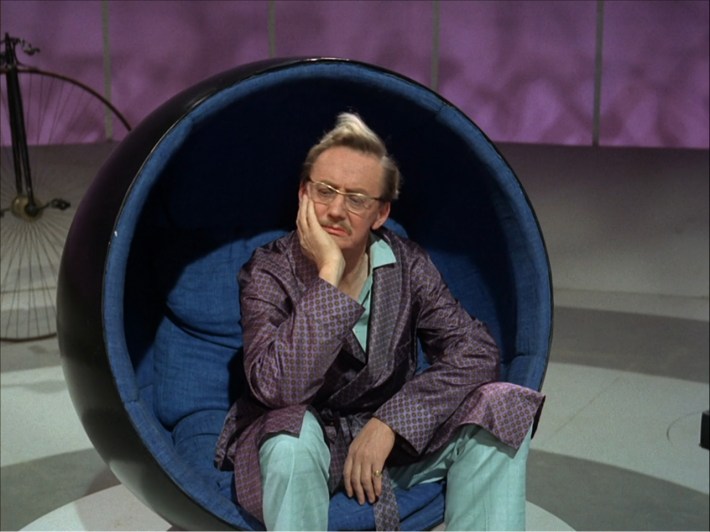
He's now under tremendous pressure from the still-unseen and unheard Number One to get results with Six; it's never stated outright why, but the destruction of the General supercomputer by Six would sure explain why he's in such hot water.
His plan establishes still more continuity, this time with the Prisoner's past. That's right: For the first time ever, we get a good look at what life was like for Number Six when he was living as your average suave, sophisticated super-spy, before his resignation got him shipped off to the Village.
Utilizing a technique developed by a new Village scientist, Number 14 (Sheila Allen), Number Two is able to tap directly into the sleeping Number Six's dreaming mind using a combination of drugs and electronics. Under normal circumstances, the layer of consciousness they're able to penetrate just runs a loop of a psychologically pivotal point in the subject's life. In Six's case, it's a loop of the opening credit sequence, in which he barges in to his superior's office and throws down his letter of resignation.
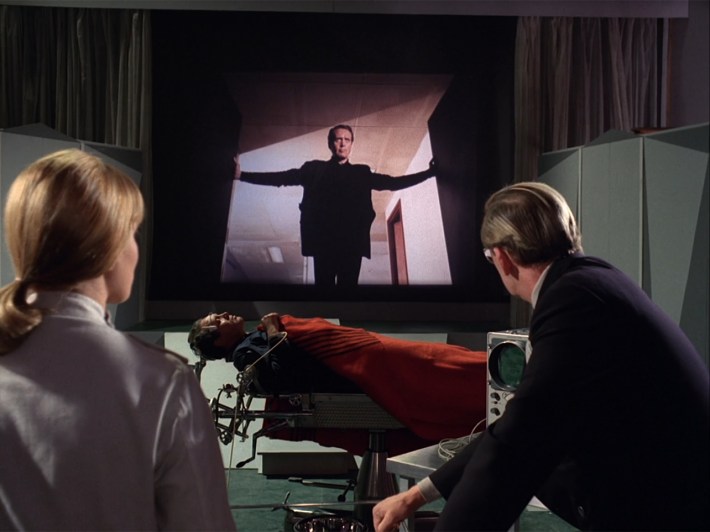
Number Two — who, it can be surmised, has had more time to study Number Six than any other person in his position — has developed a theory about that resignation. He believes that Six sold out to one of three covert agents known to regular attendees of the Parisian soirées hosted by the glamorous middle-aged socialite Madame Engadine (Katherine Kath). Two and 14 broadcast a simulation of one of her raucous black-tie galas directly into Six's mind, a whirlwind into which we're swept by an outdoor, nighttime tracking shot that follows Six as he walks through Engadine's partygoer-packed courtyard. To see Six in an environment that different from the Village, using a filmmaking technique they've rarely — if ever — employed before, has a powerful visual impact.
On their first attempt — each dose of the drug requires a great deal of recovery time, so these episodes occur on different nights — Two and 14 use a cassette to introduce candidate A. (Peter Bowles), a "good show, old chap" type who infamously defected to the other side some years prior.
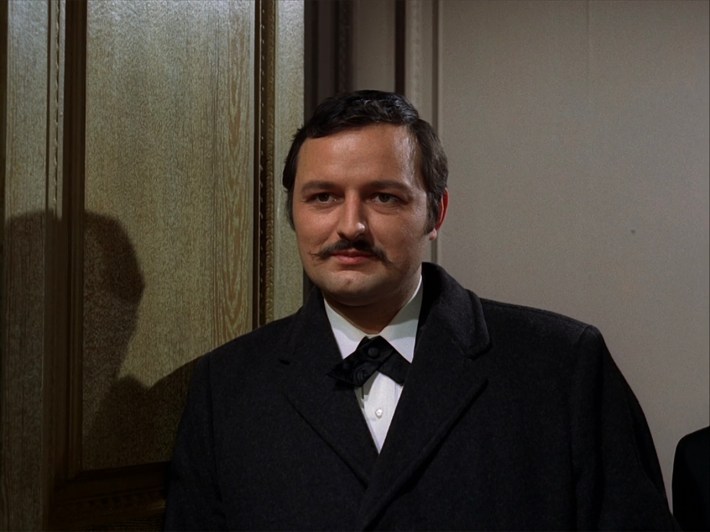
But Six's violent resistance to A.'s attempt to extract (you guessed it) information tells Two that A. was not the culprit. It seems we can deduce neither his certain resignation nor his theorized selling out had Cold War ideology behind it.
In the day that follows, Six notices both the intravenous mark on his wrist and the striking presence of the new Number 14, whose existence he vaguely remembers. "How does one talk to someone that one has met in a dream?" he asks her, in Six's increasingly poetic deadpan. Afterwards, he meets up with Number Two, who offers him a glass of milk, which I get the sense is a gesture of great magnanimity from this guy. Six declines and drops Number 14's name as he leaves, giving Two agita.
He's got good reason to have it. Throughout the episode, an enormous red phone looms ominously in Number Two's life — a hotline directly to and from Number One, who has grown impatient with Number Two's lack of progress. (I wonder if this Two's time was extended because, despite the General debacle, Six had never actually either made an escape attempt to be thwarted or been subject to a proper examination of his mind.) Before long, Number One's timeline shifts into "or else" territory, forcing Number Two to force Number 14 to push Number 6's mind to a potential breaking point.
First, however, there's candidate B. (Annette Carell), an archetypal glamorous Mata Hari type in an eye-catching psychedelic dress. We see Six at his most flirtatious yet, dancing and bantering with her but not giving an inch on where he intends to go for his "holiday" — i.e. why he resigned.
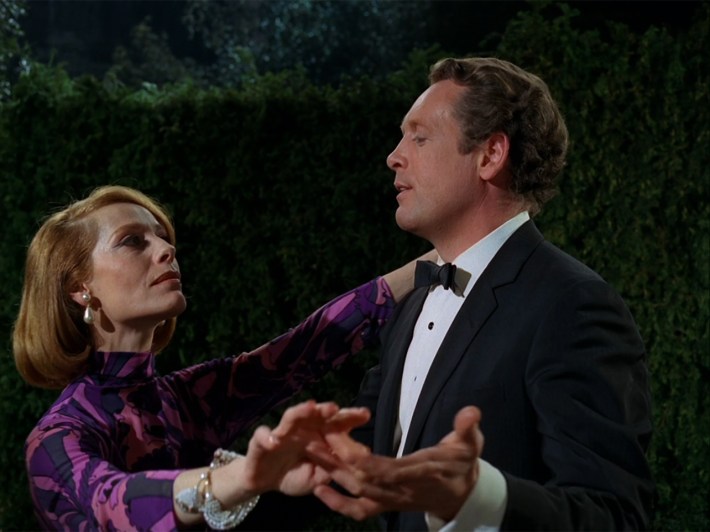
Desperate, Number Two orders Number 14 to put a theory of hers into practice despite any lack of experimentation and use audio to communicate her own words to Six through B.'s mouth. Fourteen plays upon one of Six's only real weaknesses: his desire to defend damsels in distress. Claiming that enemy agents are at the party to kill her, B. asks Six to provide her the reason he resigned as information she can exchange for her life. But when 14 unwittingly repeats a line about the need to make mistakes that she'd used earlier when she and Six encountered each other in the Village, she gives the game away. Saying "I don't believe in you," Six quizzes B. on personal information 14 has no access to, revealing the ruse for what it is.
If it's not war and it's not love that drove him, that leaves money. Candidate C. is the most mysterious of all, an agent that even the Village administrators only know by reputation. Now the purpose of the exercise is twofold: to find out why Six resigned, and to uncover C.'s identity. Though Six never names his price, the diamond earring and roulette table through which he is introduced to C. imply strongly that money would be the motive this time. So does the secret identity of C.: the fabulously rich Madame Engadine herself. Two is shocked and delighted by the revelation, vowing to have her hauled off to the Village after she'd fooled them all for years.
But what neither Two nor 14 know is that Six is fully on to them this time. He secretly broke into the subterranean lab earlier that day, discovering the elaborate procedure they're using to induce these dreams and diluting the drug that's a key component of the process. That night, he surreptitiously pours his drugged bedtime tea down the sink so his sleep will be natural. By the time attempt C. is underway, he's fully in control of the dream.
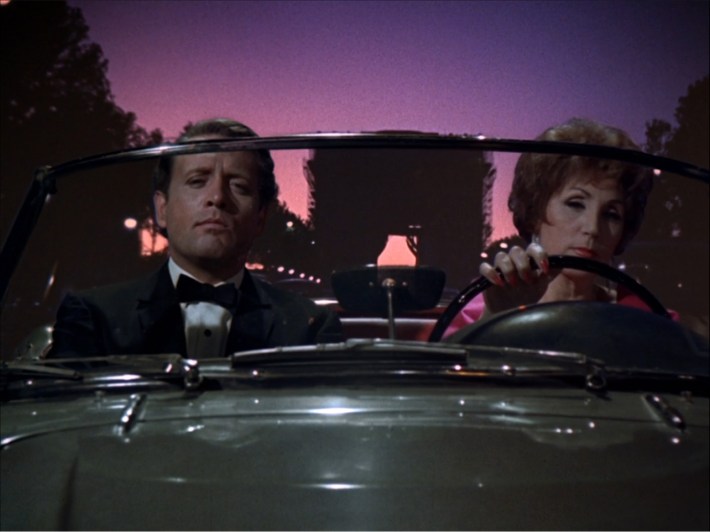
So he leads the increasingly both desperate and elated Number Two on a journey to meet C.'s previously unknown paymaster, D. After a nighttime ride through Paris, they arrive at an abandoned village, where a masked figure in a top hat, tux, and red-lined cape steps forward to claim Six as his newest employee. But Six insists on learning the identity of the man to whom he's selling out — and unmasks none other than Two himself, revealing that Six has been lucid dreaming this entire time.
In one of the show's best visuals yet, the dream Six, who Two and 14 have been observing on a giant screen this whole time, strides back into the Village and directly into the lab, where he hands the dream Two the packet of papers he'd promised to deliver to C. and D., allegedly containing the information he was prepared to sell. In fact, it's just a packet of travel brochures. Selling out wasn't the reason for his resignation, and his plans for a holiday afterwards were exactly that and nothing more. Smiling the smug smile of, as Engadine calls him, "the last sane man in the world," the dream Six settles down on the gurney in the dream lab that corresponds to his spot in the real world. As he falls asleep within the dream, the opening-credits loop in his mind begins anew on the lab's big screen … interrupted by the dreaded ring of the big red phone.
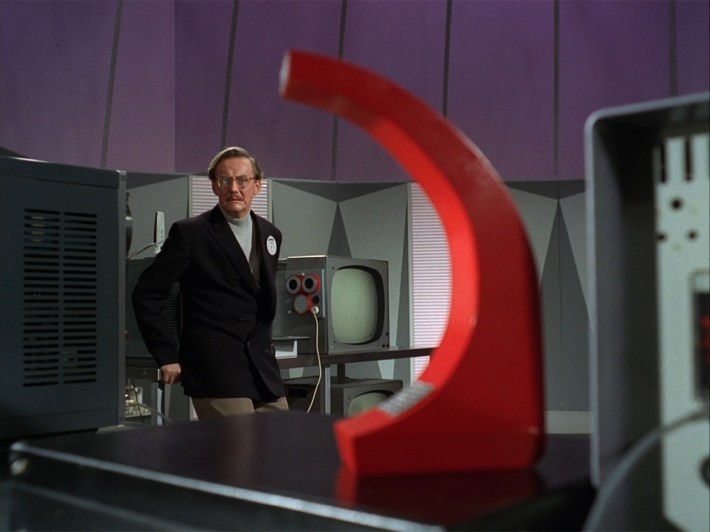
It's a knockout of an ending. Gordon is a fascinating Number Two, with a more modish fashion sense and a general vibe of, let's say, confirmed bachelorhood. Whereas previous Numbers Two who couldn't get INFORMATION out of Number Six seemed content to mess with him a bit and call it a day afterwards, this one has been tasked with getting results in no uncertain terms, with consequences that are clearly grave should he fail. This gives the episode a previously entirely unused dramatic axis around which to spin. The look of terror he shoots the phone in the episode's final shot is the finest moment to date for anyone in the role.
Meanwhile, McGoohan is an absolute hoot as the unflappable Six, confident he's beating his warders at their own game. As 14, Sheila Allen plays a reluctant Dr. Frankenstein, driven past the point of safety by the demands of Number Two. ("Where's your scientific enthusiasm?" he demands when she worries the procedure could hurt or kill the patient.) Along with Kath, Carell, and Bettine Le Beau in a momentary but memorable bit part as a French maid who catches Six's eye, Allen is one of several smoldering guest stars, and there's no crime in that: Even a spy thriller as serious-minded as The Americans understood the value of sex appeal in the spy game.
Visually, this is sumptuous stuff even by Prisoner standards. Director Pat Jackson's inventive use of rear projection helps conjure up both the giant screen on which Six's dreams are projected and the Champs-Élysées at twilight as C. drives Six to his secret rendezvous.
Dutch angles turn the third night at the party into a visual fight between Six's consciousness and the weakened drug. The costuming, from C.'s dress to 14 and D.'s respective capes, remains colorful and creative.
Even aside from the usual dystopian sci-fi psychedelia, the episode is stuffed with vividly realized and very funny sight gags as well. The guards taking off their boots and marching Six to the operating table in their stocking feet, Number Two rising up out of the floor in the Green Dome while dressed in a silk robe and pajamas, Six flashing a "Be seeing you" right into the camera through which he knows Two and 14 are watching him or staring right at us through a glass of water that's half full or half empty depending on your perspective — it's a playful, clever episode.
The shot where it all comes together for me, though, is when the dream Six enters his mind's reconstruction of the laboratory in which he is even then sleeping soundly. The image on the screen is so vivid that Two turns around to look at the door as the dream Six enters, as if certain the real Six will somehow be in two places at once and walk right through just as his mental avatar did. It's one of the show's most memorably disorienting moments and images yet — and for once, it's Six in control, leaving his captors as bewildered as they constantly attempt to leave him. The Village turns even its willing servants into prisoners.
This recap was originally accessible to paid subscribers only, and future recaps in this series are available now for paid subscribers. If you haven't already, consider supporting worker-owned media by subscribing to Pop Heist. We are ad-free and operating outside the algorithm, so all dollars go directly to paying the staff members and writers who make articles like this one possible.

